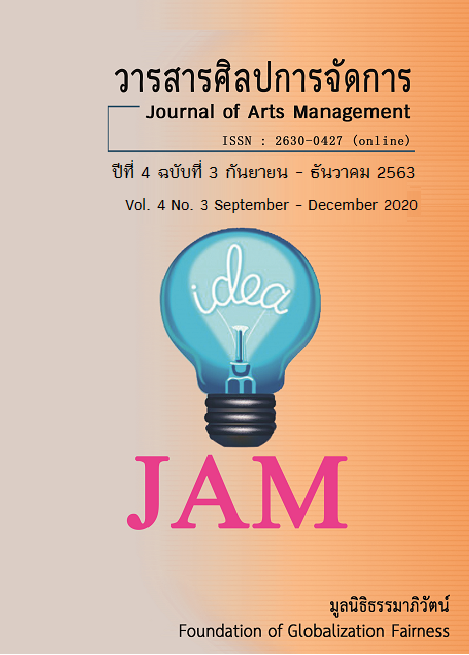The Customer Satisfaction on the Concept of Pet-Friendly Shopping Center: A Case Study of Central Festival Eastville
Main Article Content
Abstract
The purposes of the research were 1. to examine customer satisfaction on Central Festival Eastville’s concept – a pet-friendly shopping center - regarding discrete demographic; 2. to study whether a divergent visiting purpose had a dissimilar effect on customer satisfaction on Central Festival Eastville’s: a concept of pet-friendly shopping center; and 3. to investigate a marketing mix that influenced customer satisfaction on Central Festival Eastville’s concept: a pet-friendly shopping center. This research was a quantitative research. The sample size concluded 400 customers, who visited Central Festival Eastville with pet and also lived in Bangkok and perimeter. The statistical analysis included frequency distribution, percentage, mean, and standard deviation. Moreover, the hypotheses had been evaluated by t-test, F test and multiple regression.
The study of customer satisfaction revealed that the demographic of pet owner, including level of education, occupation, salary, status of marriage, type of pet, number of pets, visiting date, visiting time, visiting frequency and spending amount per visit, had an impact on Central Festival Eastville’s concept: a pet-friendly shopping center. Furthermore, marketing mix, including product and service, price, place, promotion, people, process and physical evidence, significantly affected on the satisfaction of customers as well. According to the research result, Central Festival Eastville is recommended to continuously refurbish a festive area in order to attract potential customers including their pet.
Article Details
Views and opinions appearing in articles in the Journal of Arts of Management It is the responsibility of the author of the article. and does not constitute the view and responsibility of the editorial team I agree that the article is copyright of the Arts and Management Journal.
References
กมลวรรณ สุขสมัย. (2560). ปัจจัยที่ส่งผลต่อการตัดสินใจใช้บริการศูนย์การค้า. (การค้นคว้าอิสระบริหารธุรกิจมหาบัณฑิต สาขาบริหารธุรกิจ). มหาวิทยาลัยธรรมศาสตร์, กรุงเทพมหานคร.
กรมพัฒนาธุรกิจการค้า. (2561). ธุรกิจดูแลสัตว์เลี้ยง บทวิเคราะห์ธุรกิจ ประจำเดือนธันวาคม 2561. สืบค้นเมื่อ 20 ตุลาคม 2562. จาก www.dbd.go.th/download/document_file/Statisic/2561/T26/T26_201812.pdf.
กริช แรงสูงเนิน. (2554). การวิเคราะห์ปัจจัยด้วย SPSS และ AMOS เพื่อการวิจัย. กรุงเทพฯ: ซีเอ็ด ยูเคชั่น.
ข่าวสด. (2561). ธุรกิจสัตว์เลี้ยงแตะ 3.2 หมื่นล้าน รับแนวโน้มคนโสด-สูงอายุพุ่ง. สืบค้นเมื่อ 20 ตุลาคม 2562. จาก www.khaosod.co.th/economics/news_1066457.
ชนะใจ ชื้อชวัช. (2558). โครงการศูนย์การค้าไฟล์สไตล์เซ็นเตอร์สำหรับคนและสุนัข K9 Village. (การค้นคว้าอิสระนิเทศศาสตรมหาบัณฑิต สาขาวิชาการบริหารธุรกิจบันเทิงและการผลิต). มหาวิทยาลัยกรุงเทพ, ปทุมธานี.
ธนาคารกสิกรไทย. (2562). ไลฟ์สไตล์คนยุคใหม่ ดันตลาดสัตว์เลี้ยงโต. สืบค้นเมื่อ 12 พฤศจิกายน 2562. จาก kasikornbank.com/th/business/sme/KSMEKnowledge/article/SMETips/Pages/Pets_Business.aspx.
ภิญญลักษณ์ คูสกุล. (2558). ความพึงพอใจในปัจจัยส่วนประสมทางการตลาดของผู้ใช้บริการสายการบินไทยสมายล์. (การค้นคว้าอิสระบริหารธุรกิจมหาบัณฑิต). มหาวิทยาลัยเกษตรศาสตร์, กรุงเทพมหานคร.
ลัษมา เนื่องจำนงค์. (2558). ความพึงพอใจของผู้มาใช้บริการคลินิกรักษาสัตว์ในอำเภอแกลงจังหวัดระยอง. (ปริญญาบริหารธุรกิจมหาบัณฑิต สาขาวิชาบริหารธุรกิจ). มหาวิทยาลัยบูรพา, ชลบุรี.
อรศศิพัชร์ ศิริวรรณพร. (2560). ความพึงพอใจของผู้ใช้บริการในศูนย์การค้าชุมชน กรณีศึกษา: โครงการเดอะแจส รามอินทรา, เดอะแจส วังหิน และแจส เออเบิร์น ศรีนครินทร์. (วิทยานิพนธ์เคหพัฒนศาสตรมหาบัณฑิต). จุฬาลงกรณ์มหาวิทยาลัย, กรุงเทพมหานคร.
Cochran, W. G. (1977). Sampling Techniques. (3rd ed.). New York: John Wiley & Sons.
Kardes, F. R., Cline, T. W., & Cronley, M. L. (2011). Consumer behavior. Mason, OH: South-Western, Cengage Learning.
Kotler, P. (2003). Marketing Management. (11th ed.). New Jersey: Prentice Hall Inc.
Kotler, P., Keller, K. L., Hoon, A. S., & Meng, L. S. (2008). Marketing Management: An Asian Perspective. (5th ed.). New Jersey: Prentice Hall.
Maslow, A. (1970). Motivation and Personnality. New York: Harper and Row.
Schiffman, L. G., & Kanuk, L. L. (2007). Consumer behavior: Its origins and strategic Applications. Consumer Behavior. (9th ed.). New Jersey: Prentice Hall.
Wirtz, J., & Lovelock, C. (2016). Services marketing: People, technology. (8th ed.). New Jersey: World Scientific.


